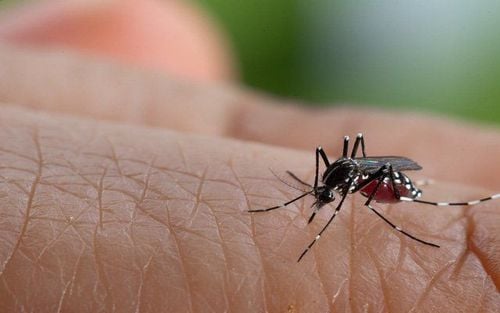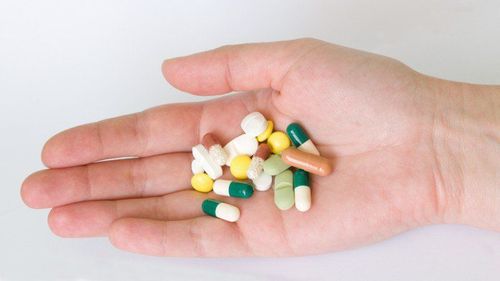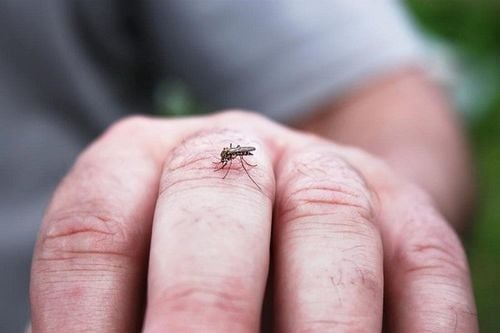This is an automatically translated article.
The article is professionally consulted by Master, Doctor Phan Ngoc Hai - Pediatrician - Neonatologist - Department of Pediatrics - Neonatal - Vinmec Danang International General Hospital.In autumn, the rainy and humid weather creates favorable conditions for the development of diseases, especially diseases related to dengue fever, hand, foot and mouth disease. To prevent disease, it is necessary to implement measures of environmental hygiene and regular personal hygiene.
1. Be wary of hand, foot and mouth disease when children go back to school
1.1 Causes of hand, foot and mouth disease
Hand, foot and mouth disease is mainly caused by Enteroviruses, the most common ones being Coxsackie A16 and Enterovirus type 71.Hand, foot and mouth disease in children is one of the most common infectious diseases in children. School environment, especially preschool children, especially children under 3 years old, are very susceptible to infection.
Hand, foot and mouth disease can appear all year round, but the disease usually occurs most often in the hot months, June, July or September, October.
1.2 Signs to recognize hand, foot and mouth in children
Hand, foot and mouth disease has quite typical and recognizable signs such as:Children naturally stop eating, salivating, crying, Small blisters on palms, soles, buttocks, knees and hands. sores in the mouth.

Trẻ em rất nhiễm bệnh chân tay miệng
1.3 Prevention of hand, foot and mouth disease in children at school
The most effective preventive measure in schools is to regularly disinfect and clean classrooms, instruct children to wash their hands, and supplement foods to help strengthen children's resistance. When detecting a sick child, it is necessary to separate the child and notify the parents to take the child to the doctor for diagnosis. After that, it is necessary to clean and disinfect classrooms, school supplies, and toys to prevent the spread of hand, foot and mouth disease to other children.1.4 Children should be taken to a doctor immediately if they have the following symptoms
Children with high fever for 2 days in a row, high fever used to reduce fever does not reduce Child startled a lot when examined or the child startled more than 2 times within 30 minutes Fluffy skin (purple veins), child is very tired, unsteady breathing exertion, apnea, tired breathing Pale skin, rapid pulse, very tired child, light pulse difficult to catch Lethargy, difficulty awakening, convulsions, coma A lot of vomiting When there is anything that worries parents. =>>> Read more: What to abstain when your child has hand, foot and mouth disease?2. Be wary of dengue fever in the season
2.1 Causes of dengue fever
Dengue fever can cause illness at any age, however, special caution should be exercised in young children. because this is the subject with the highest rate of disease.Dengue fever is a disease caused by the Dengue virus, which is transmitted by the Aedes aegypti mosquito. The World Health Organization (WHO) classifies them as dangerous infectious diseases of concern.
2.2 Signs to recognize dengue fever
Stage 1: Dengue fever has non-specific manifestations, children usually have only high fever (sudden 39-40 degrees Celsius, lasting 2-7 days, poor response to antipyretic drugs), muscle pain, fatigue body, fussiness... it's very difficult to distinguish from infection with other viruses. Stage 2: This is a dangerous stage where complications can appear and affect life. Manifestations of this stage are the appearance of hemorrhagic nodules under the skin (front of shins, inside of arms, abdomen, thighs), nosebleeds, bleeding gums... Complications may occur. such as: internal bleeding, gastrointestinal bleeding, brain hemorrhage ... need to be treated and monitored. Stage 3: The stage of recovery, the fever is gone, the condition is getting better, the appetite, the urine is more frequent, and the tests return to normal.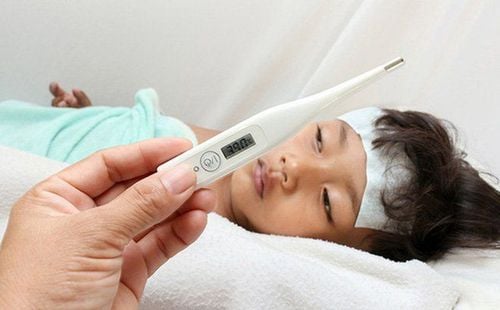
Sốt xuất huyết khiến trẻ sốt cao, quấy khóc
2.3 What to do when the child has dengue fever?
When detecting signs of dengue fever in young children, parents need to take the child to the nearest medical facility for accurate diagnosis and treatment. If the disease is mild, it can be treated as an outpatient, with scheduled follow-up visits. With severe disease, it is necessary to be hospitalized for treatment and monitoring, prevention and treatment of complications affecting the child's life. Monitor temperature regularly, give children absolute rest, do not play too hard. If the temperature is above 38.5 degrees Celsius, it is necessary to give antipyretic drugs (paracetamol dose 10-15mg/kg, repeat every 4-6 hours if the child still has a high fever) and combine with cool wipes. Do not take aspirin or ibuprofen to lower a fever. Give your child plenty of fluids to drink to replace fluids lost due to fever, giving them oresol as much as possible. =>>> See more: What do people with dengue fever eat and what to abstain to get healthy fast?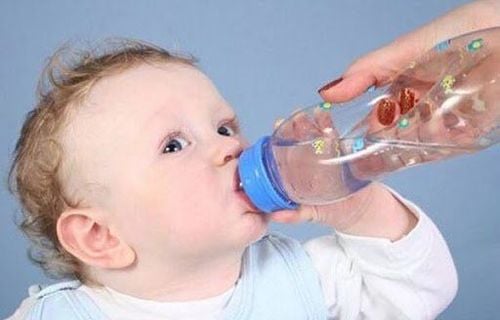
Bổ sung nhiều nước cho trẻ để tránh mất nước
2.4 Prevention of dengue fever outbreak
There is no specific treatment or vaccine for dengue in young children. The main prevention is to eliminate the vectors that transmit the mosquito-borne disease. Let children wear long-sleeved clothes even during the day, limit wearing dark clothes. Sleep under nets, day or night. Use mosquito repellent products. Cleaning stagnant water containers Clearing bushes2.5 Have the child re-examined immediately if
Children with persistently high fever, used to reduce fever in young children Children with signs of mucosal bleeding such as nosebleeds, bleeding in the mouth, vomiting blood, bloody stools, bleeding on the skin a lot Children vomiting a lot , poor appetite, increasing abdominal pain, severe pain in the right lower quadrant Child's pulse is fast, light, difficult to catch, looks tired, cold hands and feet, sweating a lot, urinating less When there are any signs Concerned family members In order for children to be healthy and develop well, it is necessary to have a nutritious diet in terms of quantity and quality balance. If children are not provided with adequate and balanced nutrients, it will lead to diseases of excess or lack of nutrients, which adversely affect the comprehensive development of children in terms of physical, mental and motor skills.Children who do not eat properly are at risk of micro-mineral deficiency causing anorexia, growth retardation, malabsorption,... If they notice the above signs, parents should supplement their children with products. The supplement contains lysine, essential micro-minerals and vitamins such as zinc, chromium, selenium, and B vitamins to help fully meet the nutritional needs of children. At the same time, these essential vitamins also support digestion, enhance nutrient absorption, help improve anorexia, and help children eat well.
Parents can learn more:
Signs of zinc deficiency in children
Micronutrient deficiency and failure to gain weight in children
Please regularly visit Vinmec.com website and update useful information to take care of your child. Take care of the baby and the whole family.






